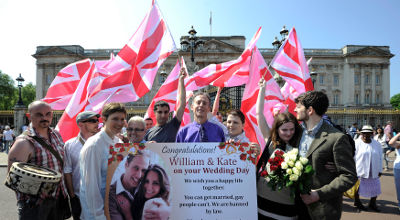Britain Outlines Controversial Same-Sex Marriage Plans
Britain outlined plans on Tuesday to allow same-sex marriage that have split Prime Minister David Cameron’s Conservatives and raised fears among religious groups they will be forced to hold same-sex weddings.
Gay couples may already have “civil partnerships”, conferring the same legal rights as marriage, but campaigners say the distinction gives the impression that society considers gay relationships inferior.
Cameron has stressed he is a strong backer of gay marriage but does not plan to force his party’s members of parliament to vote in favor of legislation, which will apply to England and Wales and be introduced by the end of the current parliament in 2015. Scotland has separate plans for same-sex marriage.
Opponents of the measure include the Church of England and several members of Cameron’s own party.
“In each century parliament has acted, sometimes radically, to ensure marriage reflects our society, to keep it relevant and meaningful,” Culture Secretary Maria Miller told parliament.
“For me, extending marriage to same-sex couples will strengthen, not weaken, this vital institution, and the response I’m publishing today makes clear that we will enable same-sex couples to get married through a civil ceremony,” she said.
“We will also enable those religious organizations who wish to conduct same sex marriages to be able to do so,” she added.
Anglican Exclusion
However, she made clear that under the proposals it would remain illegal for churches belonging to the Church of England to marry gay couples—an exclusion the established church itself requested.
Other religious groups, such as Quakers and liberal Jewish groups, could choose to marry gays, but under the proposals no individual minister would be compelled to wed a same-sex couple.
Gay-rights group Stonewall welcomed the legislation.
“We’re delighted about the government’s statement today and welcome the promise to legislate for equal marriage as warmly as on the three previous occasions that this announcement has been made,” said Stonewall Chief Executive Ben Summerskill.
“While we fully respect the point of view of those who oppose the government’s plans, our advice to them remains that if you don’t approve of same-sex marriage, then just make sure you don’t get married to someone of the same sex,” he added.
The move to legalize gay marriage comes after a public consultation on the issue, and is seen by political analysts as a way for Cameron to broaden the appeal of his center-right Conservative Party and burnish its liberal values.
Same-sex marriage is backed by many prominent Conservatives and the party’s partners in coalition government, the Liberal Democrats, as well as the opposition Labour Party.
However, the plan has run into strong opposition from some Conservative lawmakers, on religious grounds and because of what they say is a lack of a democratic mandate.
Some also say there more pressing issues at a time of economic weakness and spending cuts than gay marriage.
“First of all I am a Christian and I do not believe in the redefinition of marriage. Millions of people across the country take that view as well,” Conservative lawmaker Peter Bone said.
“However, my argument is this. I have re-read the Conservative, Labour and Liberal Democrat manifestos and the coalition agreement. There is nothing in there about re-defining marriage, so there is no democratic mandate,” he added.
Opinion polls on the issue have shown mixed results.
Eleven other countries have already legalized same-sex marriage. The U.S. Supreme Court stepped into the debate for the first time last week by agreeing to review two challenges to federal and state laws that define marriage as a union between a man and a woman.
Reporting by Mohammed Abbas; editing by Andrew Roche.
© 2012 Thomson Reuters. All rights reserved.




























































